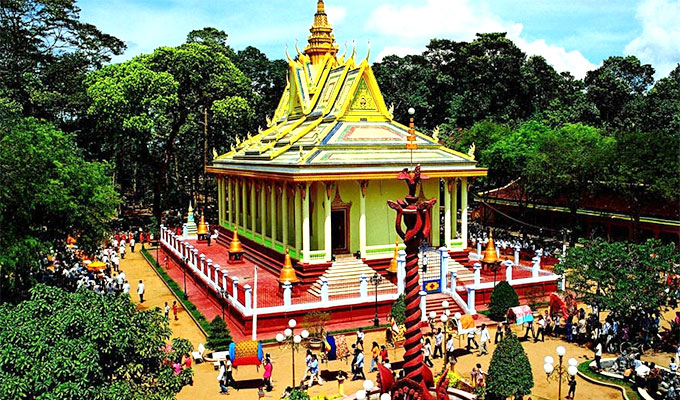Around 130 kilometres from Ho Chi Minh City, Tra Vinh province possesses rich potential in both natural landscapes and culture and is considered as an attractive destination for visitors to the Southwest region.

Hang pagoda, one of the most visited Khmer pagodas in Tra Vinh province
As a coastal province positioned between the Tien and Hau rivers, Tra Vinh has many canals, rivers, ponds and beautiful beaches that make up the unique landscape of the Mekong Delta region.
One of the most popular tourist sites in Tra Vinh is Ba Dong beach in Duyen Hai town, which is 55 kilometres from the central city. Ba Dong coast is lined with beautiful pristine white sand hills and green casuarina trees rustling in the sea breeze. Visitors to the beach will be enchanted with the tranquillity of the natural landscape as well as having the chance to sample fresh and tasty sea food at local restaurants while enjoying the breath of the salty sea air.
Another popular tourist spot is Ba Om pond, around seven kilometres to the southwest of Tra Vinh City. The large, square pond is a favourite with local picnickers at the weekend and holidays thanks to its fresh water and surrounding ancient trees. In the right season, the pond water surface is embellished with pink lotuses or red water lilies.
The pond is also a spiritual site for the Khmer ethnic group as it once served as a bathing pond for the 10th-century Angkor-era temple that was situated here. Many traditional festivals of the Khmer people, such as Chol Chnam Thmay, Sen Don Ta and Ok Om Box, are hosted at the site.
Mother Nature and the tectonic process have also given Tra Vinh Con Ong - Long Thanh hot mineral spring water in Duyen Hai town, which is an ideal activity for visitors who are seeking relaxation and natural therapy.
In addition to its natural landscape, Tra Vinh has many cultural, historical and architectural sites, making it easier for the province to develop spiritual and cultural tourism. The province hosts 143 Khmer pagodas, which were built in the traditional Khmer architectural style, as well as having the typical features of Khmer Theravada Buddhism. Prominent among them are Nodel, Hang, Giong Lon and Ang pagodas, with the last mentioned being one of the most ancient and most visited Khmer pagodas in the Mekong Delta region.
By timely utilising the assorted advantages, the provincial tourism sector has gained encouraging achievements. Nearly 600,000 tourists visit Tra Vinh every year, bringing approximately VND 160 billion in total revenue to the local hospitality sector.
Eyeing tourism as a key economic industry, Tra Vinh provincial authorities have developed a programme on boosting tourism with a focus on improving the province’s infrastructure which can comfortably accommodate visitors while hosting major cultural, tourism and sporting events.
The province has set the target of welcoming 2.5 million visitors by 2025, including 85,000 foreigners, aiming to gain an annual revenue of VND 1.6 trillion from tourist activities.
Tra Vinh provincial authorities have also attached great importance on putting forward preferential policies to stimulate more investment, increasing tourism promotion programmes and strengthening connection with other localities in the region. The provincial People’s Committee has approved to spend VND 14 billion in order to carry out tourist promotion activities until 2020.
Efforts have also been made to call for investment to upgrade Ba Om Pond into a national tourist site and to further develop other tourist sites such as the rhizophora ecological tourist area, the Ba Dong mangrove forest, and Duyen Hai mineral spring.